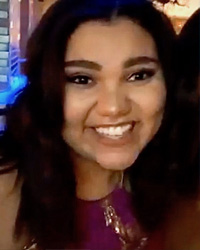
Hometown: Tempe, Arizona
Undergraduate: BS in neurobiology and BS in psychology, Arizona State University
Graduate: Neuroscience PhD program, 2023
Candace Rizzi-Wise is a member and co-founder of the Biomedical Graduate Students for Diversity and vice president of event management for the Biomedical Sciences Graduate Student Association.
Can you tell me a little bit about yourself before you came to Drexel?
Before I came to Drexel, I got bachelor’s degrees in neurobiology and psychology from Arizona State University. While at ASU I did research in cognitive psychology and I did a summer research program at Princeton Neuroscience Institute, which is how I knew I wanted to get my PhD in neuroscience.
Why did you come to Drexel?
I came to Drexel because its location and graduate school environment were both important to me. Drexel being in Philly is great because it is surrounded by a lot of different areas where there is always something to do! Compared to other programs I visited, the student camaraderie here is unmatched — Drexel students are very welcoming, supportive and friendly; we just want to see each other succeed. Both of these factors, along with the innovative research, made Drexel a great match for me to pursue my graduate education.
What has your relationship with faculty been like?
My relationship with faculty has been very open and helpful. I have always felt that I could go to them for any kind of help – whether academically related or otherwise.
How about the relationship with your classmates?
My classmates are my biggest support system. We all recognize the hardships of grad school and it helps a lot to have friends in the program who are always willing to help in any way they can.
Can you tell me about the research that you are doing?
I am in the Wang Lab and we use optogenetics, behavior and in vivo electrophysiology to study neural circuits. Specifically, I use these techniques to study hippocampal-to-lateral septum circuits that underly contextual fear in relation to other contexts.
Are you involved with any extracurricular activities? How do these support your academic journey?
In addition to my graduate research I am on the board of the Biomedical Sciences Graduate Student Association (BSGSA) and a member of Biomedical Graduate Students for Diversity (BGSD). BSGSA has been great because I get to interact with students from different programs and advocate for graduate student needs to try to make academic experience the best it can be. In addition, BGSD has been very fulfilling, specifically our outreach initiatives with middle school to undergraduate students to foster increased representation of underrepresented minorities in science.
What are your long-term goals?
Long-term I am planning to have a career in industry where I can use the technical and translational skills I’ve learned in a more clinically relevant job. I also hope to continue advocacy initiatives and outreach in my future endeavors.
What advice would you give to a future student?
Graduate school is a difficult journey, and it is easy to get burnt out so make sure you find a good support system, maintain a healthy work-life balance and celebrate the little things!